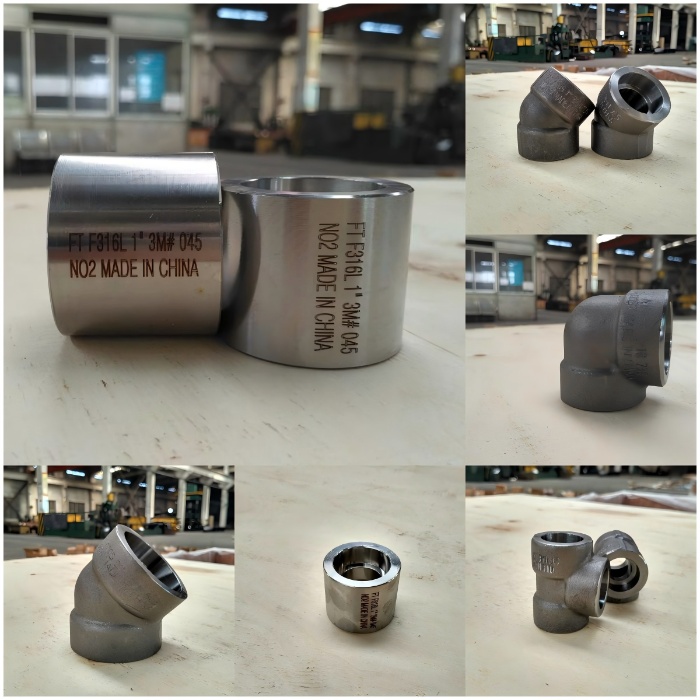Forged fittings are essential components in various industrial applications, providing reliable and durable connections in piping systems. Whether used in oil and gas, chemical processing, or high-pressure applications, forged fittings are known for their strength and resilience. However, the cost of these fittings can vary widely based on multiple factors. This article will break down the key aspects influencing the price of forged fittings, the types available, and tips for finding the best value.
Types of Forged Fittings and Their Price Ranges
Understanding the different types of forged fittings is essential, as each has a unique cost based on its function and material.
Elbows and Tees: These common fittings are used to change the direction of piping or split flow. The price for standard forged carbon steel elbows or tees ranges from $2 to $10 per piece, depending on size and specifications. Stainless steel variants can range from $5 to $20 each due to their higher durability and corrosion resistance.

Couplings and Unions: Used for connecting two pipes or allowing for easy disconnection, couplings typically range from $1 to $8 per piece for carbon steel. Unions, which provide a more secure and tight connection, can range from $5 to $15 or more, depending on the material.
Plugs and Caps: Essential for sealing pipe ends, forged plugs and caps can cost anywhere from $1 to $6 for carbon steel versions and $3 to $12 for stainless steel types.
Bushings and Reducers: These fittings, which help adjust pipe sizes, generally cost between $3 and $15 for standard sizes, with larger or specially coated versions potentially costing more.
Factors Influencing the Cost of Forged Fittings
Several factors can impact the price of forged fittings, from material composition to market conditions. Here’s a breakdown of the main elements:
Material Composition: The type of metal used is a primary cost determinant. Carbon steel fittings are generally more affordable than those made from stainless steel, alloy steel, or other specialty metals. The added corrosion resistance and longevity of stainless steel make it pricier.
Size and Pressure Rating: Larger fittings or those designed to withstand higher pressure ratings (e.g., Class 3000, 6000, or 9000) tend to cost more. The higher the pressure rating, the more robust and expensive the fitting becomes.
Manufacturing Standards: Forged fittings produced according to stringent standards such as ASME or ASTM have higher costs due to their certified reliability and performance.
Surface Treatment and Coatings: Fittings with special coatings, such as anti-corrosive or galvanization treatments, come at a premium price, adding an extra 10–30% to the base cost.
Additional Costs to Consider
Beyond the base price of the fittings, other costs may impact your overall budget:
Shipping and Handling: Heavier or bulkier forged fittings can result in higher shipping fees. For international purchases, import taxes and customs duties should also be considered.
Custom Orders: If your project requires custom-made fittings or specific material grades, expect higher costs and longer lead times.
Certification and Quality Assurance: Fittings that come with full certifications and extensive quality assurance documentation may be priced higher due to the additional verification processes involved.
Tips for Finding the Best Value
To ensure you’re getting the most for your money, consider the following tips:
Bulk Purchases: Ordering in larger quantities can often secure a discount from suppliers, making it more cost-effective for larger projects.
Compare Suppliers: Prices can vary significantly between suppliers, so obtaining multiple quotes can help you find the best deal.
Check for Local Suppliers: Choosing a local supplier may help save on shipping costs and reduce delivery times.
Evaluate Long-Term Costs: While cheaper fittings might be appealing, investing in high-quality, durable materials can save money on maintenance and replacements in the long run.
The cost of forged fittings depends on various factors, including material, size, and additional features like coatings and certifications. While prices can range from a few dollars to higher amounts for specialized or high-pressure options, understanding these factors can help you make informed decisions and optimize your budget. By considering the type of fittings needed, comparing suppliers, and evaluating long-term benefits, you can secure high-quality forged fittings at a reasonable price for your project.

